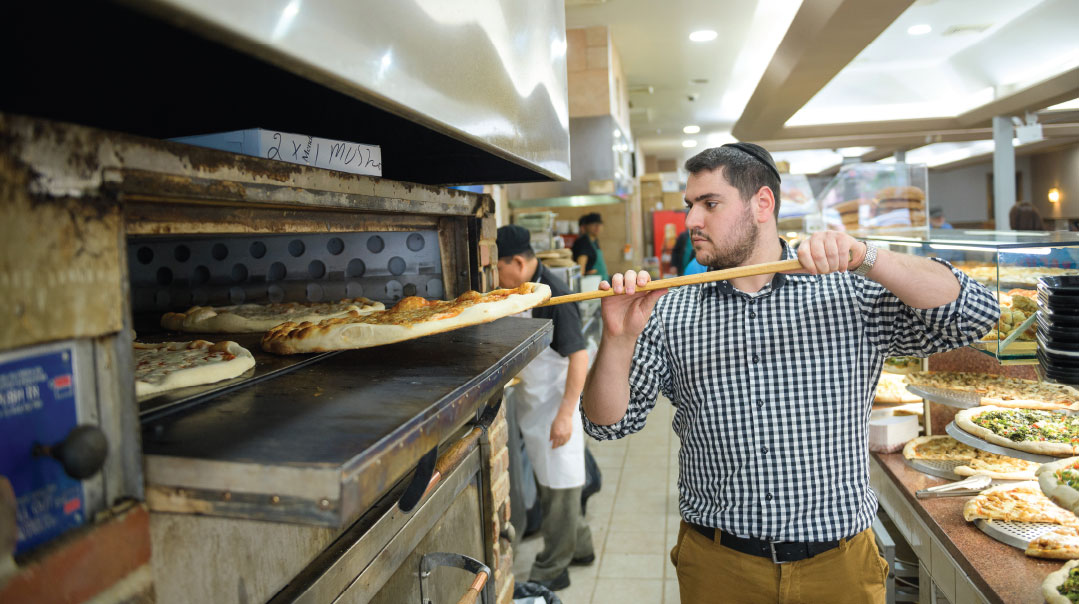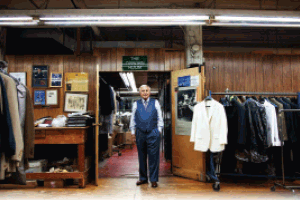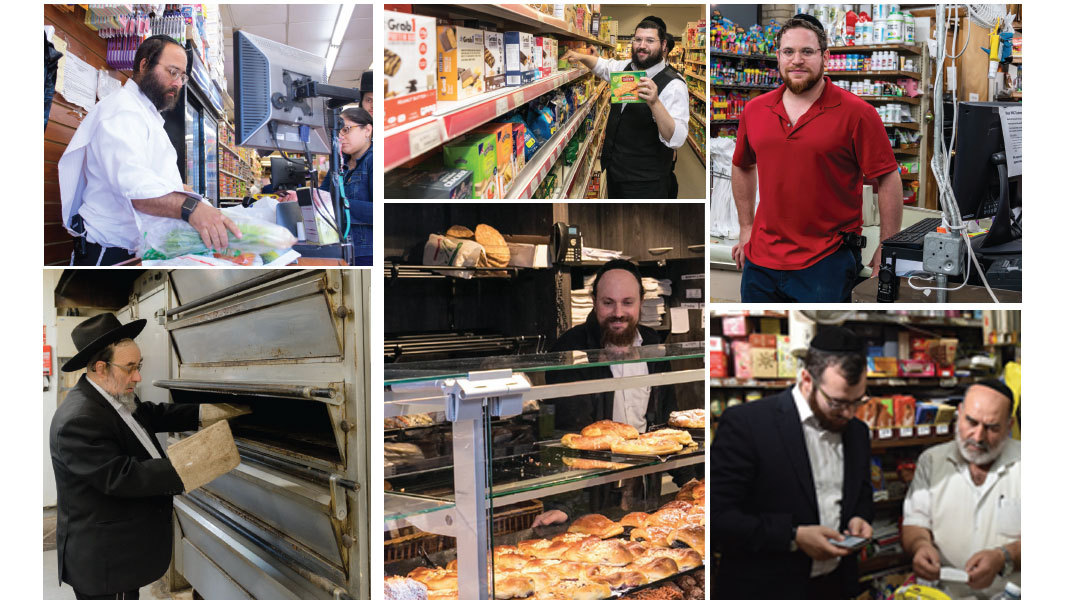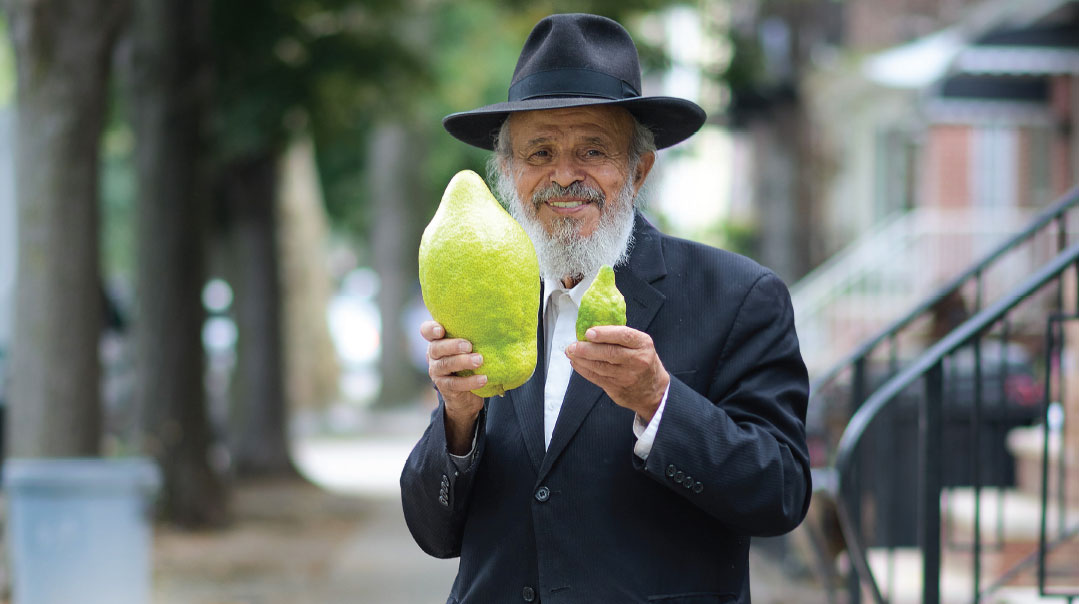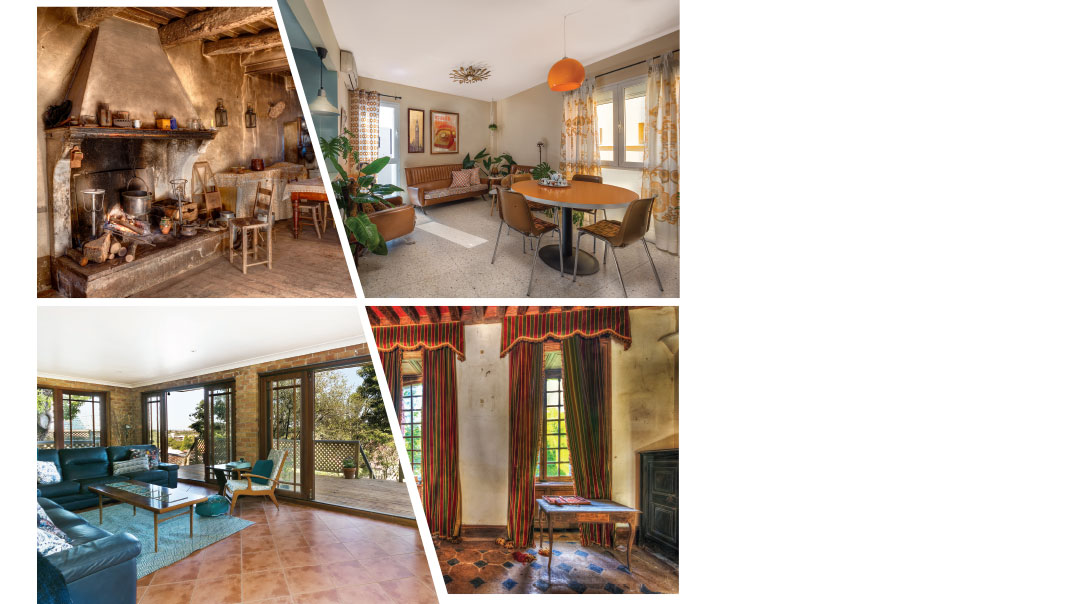Guests for Shabbos?

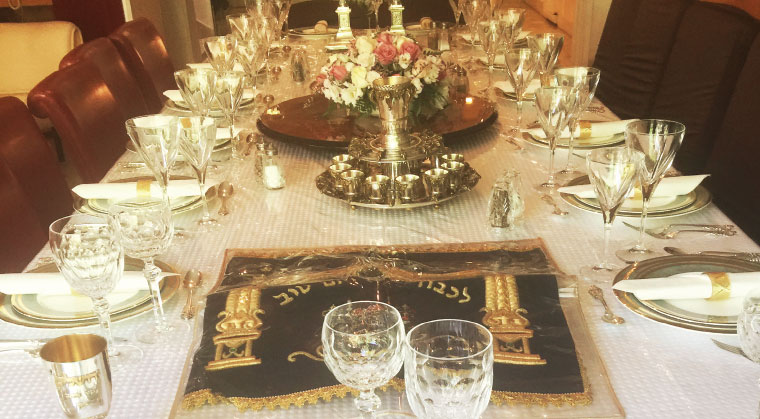
The table was set the family was gathered around and everyone waited for Ima to join the Shabbos feast. Instead she stood at the front door and peered out into the night. In her minuscule Yerushalmi apartment she was but three steps away from the dining room. But she may as well have been in another city.
“Abba” she called out concern filling her voice. “No guests?” Abba explained that there had been no one in shul. Lieba fell silent for a moment. “Perhaps we can send the kinderlach down to see if there is anyone out in the streets” she suggested. And that’s what they did. Abba and Ima waited with the malachim while the kids went scouting for guests.
For my grandparents Moshe Dovid and Lieba Tenenbaum Shabbos was so synonymous with hachnassas orchim that it was simply inconceivable to make Kiddush without someone — anyone — gracing their home.
Reading months ago about Henny Machlis a”h who passed away this year and the family’s legendary Shabbos hospitality was both inspirational and frustrating. Here is someone who took the mitzvah of hachnassas orchim and made it her own. She invested in it. She acquired it fully — she made it her life business. One can barely begin to imagine the Celestial splendor of the table over which Henny presides for eternity. At the same time the scale of her hospitality produces a visceral tug. Can anyone else ever come close?

There are those who try. We went in search of people who regularly host 30 or more every Shabbos. The great surprise was how many families fit the bill. Less surprising and just as inspiring were that many of the qualified candidates refused to be interviewed. As one person put it: “I invest too much into this mitzvah to lose out by going public.”
How do these families do it? What gives them the impetus to host week in week out? And — above all — what can we come away with that will help us expand our own Shabbos table?
Name: Bonnie & Alan Cohen
Location: Mamilla, Jerusalem
No. of Guests:18 at the seudah/60–200 at the oneg
House Special:
“I bake between 20 to 24 dozen chocolate chip cookies at a time, so when people turn up they can always have warm cookies — I think that’s what they really come for!”
Shabbos Special:
“When I wrap my challahs in aluminium foil before placing them on the hot plate to keep warm, I always write a note to my husband thanking him for something he’s done that week and hide it inside. He finds it when he unwraps the challah.”
F
or years Bonnie Cohen’s high-end dinnerware sat on lonely display in her china cabinet. Kept for “best,” she took them out only on Thanksgiving. Nowadays, her china and silver come into their own every single week. Bonnie has discovered Shabbos.
When Bonnie and her husband, Alan, began visiting Israel from Los Angeles, Shabbos was still something of a curiosity. “When we first started out, someone had us over for a meal. We were blown away,” remembers Bonnie. “No one asked us what we did for a living, or what we had… They had this tiny house (we had a big one) and yet they shared whatever they had and we loved that. This is Judaism!” That was when the kernel took root. Bonnie was determined to be like that: to give, to do chesed.
Today, the Cohens regularly host total strangers for each Shabbos meal, but in order to accommodate the massive overflow of houseguests, they fling open their doors toward the end of the Friday night meal for the most popular oneg Shabbos in town. “Eighteen is my upper limit for the Shabbos seudah, as it is important for me to hear each person’s story. The oneg began because there were always more people calling to come for the meal, so we told them to come around after…”
During the seudah, Alan goes around the table and asks the guests to share their names and what they are doing in Israel. Then he does a second round, collecting stories from anyone who wants to share. “The one thing we’ve learned,” says Bonnie is that we can expose Judaism, we can’t impose it.”
Guests start arriving for the oneg while the Cohens are still eating, but they already know to make their way to the balcony, where chairs are waiting, stacked to the ceiling. “In the summer it’s easier, as they can sit out there as well, but we always push all our furniture back to fit everyone in. We have had up to 200 people coming and going. Sixty to seventy is standard. Sometimes we have great singers — they can stay half the night. People discuss all kinds of stuff, though we try to steer the talk away from politics — we want people to have a good time.”
Bonnie loves to shop, cook, and host guests, so she doesn’t need to dig hard for motivation. “I’ve been doing this, bli ayin hara, for over 23 years, and I have never been sick on Shabbos.” Still, she has cleaning help during the week, as well as people who come to help out specifically on Fridays.
“We eat a very healthy diet — one that is very labor intensive. I make everything from scratch.” And yet, the positive energy Bonnie exudes is inescapable — “I love the Jewish People and as long as I have the energy, Shabbos hosting is the greatest gift in the world.
“We used to host guests back in L.A. I was involved in EYAHT there and we would invite the girls over for Shabbos,” says Bonnie, remembering how their hospitality venture took off. By the time they moved to Jerusalem, the Cohens were well known, and people continued to gravitate to their place in Mamilla. Theirs is an eclectic group of guests. Frum people, as well as non-frum, young and old. Many of the Cohens’ guests undergo a spiritual awakening during their time in Jerusalem, and the Cohens, with their warmth and lack of judgement, help them any way they can. Bonnie often offers to meet her guests on Erev Shabbos and walk them back to her home for candlelighting.
“I take pictures of them before we light and send it to their mothers to wish them Good Shabbos. The mothers love it.” There is even a Facebook page called “I did Shabbat with Bonnie & Alan Cohen in Jerusalem.”
One of their more memorable guests was a nun with questions about her faith. Accused of being “spiritually deficient,” she approached Father Murphy, her church’s head father, for explanations. He, in turn, agreed to pass along her questions to an Orthodox rabbi he happened to be acquainted with. Years after her eventual conversion, the nun was standing in an airport terminal when she heard someone call out to her: “Sister Francis!” Turning around, she saw a frum, black-hatted Jew. It took her a few moments to grasp that she was looking at none other than her old mentor, the former Father Murphy, who had led her to the answers she had sought.
Listening to Bonnie’s brimming enthusiasm for everything Jewish, it is easy to understand how her guests come away inspired.
“From the outside looking in — before we became BTs — Shabbos didn’t make sense to me,” she candidly admits. “And yet, now that we keep Shabbos, I don’t know how I ever lived without it.
“I love my life,” she adds. “I’ve had a lot of challenges, but I love being Jewish. There are so many Jews who are so lost and nothing is more powerful than a Shabbos meal… letting them see Judaism alive in your home.”
Name: Rabbi Benjy & Goldie Morgan
Location: Golders Green, London
No. of Guests: 30 +
House Special:
“The biggest impact we can have on our fellow Yidden is to invite them into our homes and show them the beauty of what we have. They don’t bite! All they want is a bite to eat — from this world and the World to Come.”
Shabbos Special:
“More than any divrei Torah, it’s my wife’s cooking, her home-baked challos, and our kids’ singing that really touch our guests.”
R
abbi Benjy Morgan and his wife Goldie work for the JLE (Jewish Learning Exchange) in Golders Green, London. An unofficial — but significant — part of their job description is hosting large numbers of unaffiliated Jews for Shabbos.
“We have something so special in Shabbos,” says Rabbi Morgan. “Sometimes we take it for granted, not realizing how unique this gift is in our world. A family sitting around the table, singing — it’s mind-blowing.”
Preparing the home each Erev Shabbos for large numbers of guests is no easy task, but Mrs. Morgan keeps the hospitality enterprise running smoothly. Goldie does all the shopping and cooking herself — she is adamant about that. “But she doesn’t make herself a shmattah,” claims the rabbi. The shopping starts on Wednesday, and help is brought in for setting up the tables and the cleaning. “It’s the only way to do it without burning out, especially with five little kids.”
What keeps them motivated, week in, week out, to continue preparing huge meals for people they don’t know?
“These people are our brothers and sisters,” they answer.
This kind of attitude works its own wonders. Rabbi Morgan recalls a girl who ate at their house one Shavuos. Goldie happened to serve a platter of cold cuts and the girl asked if there was a custom to eat ham on the holiday (!). “I told her: ‘No. That’s Rosh Hashanah. Just kidding.’ This guest got married a few months ago to a frum Jewish lawyer. There was a mechitzah at her wedding, and she proudly sports a sheitel.”
“When you know your guests’ stories and see the smiles on their faces as Kiddush or Shalom Aleichem is sung,” insists Rabbi Morgan, “you know that you can’t not do it.”
Rabbi Morgan says he keeps his guests entertained with divrei Torah, inspiring stories, and lessons from the parshah. “No evolution, G-d, or hashkafic debating at our Shabbos table,” he says.
But what about the guest who asks the tough questions, the one intent on spoiling the Shabbos atmosphere? Rabbi Morgan says he deals with the provocateurs with love and acceptance.
“I follow the approach that I learned from one of my rebbeim, Rav Mattisyahu Salomon shlita. I say: ‘That’s a great question, Adam. But it requires more than a two-minute answer. Are you free for coffee on Sunday? We could meet and give that question the respect it deserves.’ ”
And the invitation is solid. The Morgans meet and teach hundreds of young Londoners every week. It’s what they have dedicated their life to doing.
When asked whether he sees hosting dozens of unaffiliated Jews every week as something of a calling, Rabbi Morgan’s answer comes easily. “Yes. Very much so. My parents became frum when I was five and we moved from an affluent London suburb to Ir HaKodesh, Gateshead — a coal mining town in northern England. We used to eat at the Shabbos table of some of Gateshead’s Torah giants, and also by poshute Yidden, and I saw firsthand the impact this had on my family. As I grew up, I naturally wanted to give back in kind.”
Still, the Morgans are careful to balance the large-scale hosting with family time. “Some meals we do larger, some smaller. We hosted 75 for a Friday night dinner last week, and then did just ten a week later. It’s about constantly feeling and finding out what is right for you and your guests,” says Rabbi Morgan.
One way the couple manages to strike a balance is by hosting for only one out of the three Shabbos meals, for three weeks out of every four. “The other two meals we make time for the kids,” the rabbi explains, “and at the beginning of each meal (before they go off to play) we focus on them and their stories. The kids love it, too. In fact, they are often disappointed when we don’t host, and beg for guests.”
And in this way, the mesorah is handed to the next generation.
Name: Shoshana & Yitzchok Roodman
Location: Cincinnati, Ohio / formerly Far Rockaway, NY
No. of Guests: 10 to 50
House Special:
“I’m big into budgeting and we make a cheshbon on everything. But Shabbos is different. I believe with my whole heart that the money we spend on Shabbos is not part of our cheshbon.”
Shabbos Special:
“We don’t provide free-flowing liquor. It’s one l’chayim for tradition, and that’s it. But there’s lots of zemiros. My son sits on my husband’s lap and they sing together. The whole table joins in…”
W
hen dating, the Roodmans shared their visions of a bustling, open house once married. “As a newlywed, my husband laughed because I insisted on a spare freezer right away,” says Shoshana. And yet, even Shoshana was taken by surprise when just one week after the wedding their friend, a single guy, called up and invited himself for Shabbos. Word soon got around, and before long they would seat as many as 50 guests around their Shabbos table.
“A friend called just after birth,” recalls Shoshana “and invited her entire family over to us for the shalom zachar Shabbos.”
Shoshana Roodman is the quintessential enthusiastic hostess, while Yitzchok is more of a listener. “But that makes him a great host too,” Shoshana points out. “People enjoy talking to him.” He also has a knack for pacing the meal. Like small talk and timing, there are multiple elements besides cuisine that go into successful hosting.
Shoshana seems to have a natural flair for it. “One needs to know which crowds to have together… We try not to have people without kids at the same meal as people with tons of them, for instance. You never know what people are going through in their personal lives. And when kids come, we organize a playroom so they can pretty much do whatever they want.”
The Roodmans have been married for six years, and have lived for most of that time in New York. They recently moved to Cincinnati, however, where their apartment is much smaller.
“These days we just host around three or four couples at a time, as our apartment won’t stretch to much more than that. But even when we were in New York, our policy was not to do two Shabbosos in a row of too many people. So even though we may have hosted around 40 or 50, after a very busy Shabbos we would cut down to around ten guests the week after.”
But even now, in their new locale, the Roodmans don’t shy away from larger numbers when the need arises. “We recently hosted a sheva brachos in our shul, together with the rav and rebbetzin, and 87 guests, for a shidduch we made.”
Listening to Shoshana, it’s easy to discern how one mitzvah begets another. “When we first arrived here we had no electricity, so we moved into Rav and Rebbetzin Weinrib’s home for a few days. We met a single guy there and told him he was welcome to come for a meal once we got our act together. At our Shabbos table, I suggested a shidduch for him. Turned out, he was dating someone else at the time, but a few months later he called back.”
Shoshana and Yitzchok redt him her seminary roommate — and that turned out to be the couple they made their most recent sheva brochos for. Another sem friend was a bas bayis by the Roodmans. They set her up on a date and she has just given birth to her third child.
When asked whether she finds the constant hosting draining or stressful, Shoshana energetically objects. “It’s a personality thing. I’m a big people person. Love schmoozing… love hosting… don’t get stressed out from it at all. I have also seen time and again how opening our home to guests brings so much brachah…”
Luckily, when it comes to preparation, Shoshana doesn’t do it all alone. Generally, Yitzchok shops, while Shoshana sets the table and serves. They cook together, although there are always exceptions.
“When I was expecting my son, I was on bed rest. Yitzchok pulled off the Shabbos hosting without blinking an eye… I couldn’t stand up (I was suffering from terrible sciatica), and yet my husband just got on with the show. He served the courses, cleaned up… everything.” Teamwork is key. “I wouldn’t be able to do it without him!”
One thing Yitzchok does without fail is review their son’s parshah sheet each week, “because we both feel a child cannot be forgotten when guests are present.”
Shoshana advises that families should only host if they enjoy doing so. “Don’t do it begrudgingly. If you don’t do it with your whole heart, your guests will feel it.” For those who would like to host, but find the idea of having so many people daunting, she shares some simple advice. “Start slowly — with one or two couples at a time — and up the ante as you wish. Ignore gourmet. Make unpretentious, basic food. People don’t come for the cuisine. They come for the company and for pleasant conversation.”
Name: Michael & Marcia Kaufman
Location: Old City, Jerusalem
No. of Guests: 40–50
House Special:
“We heard the quasi-governmental body in charge of the reconstruction of the Jewish Quarter in the Old City of Jerusalem was auctioning off apartments to the highest bidders. Spotting an apartment in a splendid location — overlooking the Western Wall Plaza — we examined our bank account, submitted a high bid, and held our breaths…. It would be the perfect place to welcome estranged Jews.”
Shabbos Special:
Michael encourages other Orthodox Jews to host unobservant Jewish guests by simply being themselves. “Conduct your normal Shabbos table — and Shabbos will do the rest.”
M
ichael and Marcia have welcomed guests to their Shabbos table in every locale where they’ve lived. Even though they have since moved to the Jerusalem suburb of Telz Stone, they became well known for their hospitality in the Old City of Jerusalem. Michael was interested in kiruv rechokim from way back when kiruv wasn’t a well-known term. And, like Avraham Avinu before him, he always thought nothing could beat a good meal and a few well-placed, kind words for effective kiruv. When they first moved in to their new apartment in the Rova, Michael approached Reb Meir Schuster z”l — the iconic kiruv recruiter who would bring unaffiliated youth into Orthodox homes for Shabbos — and offered their Shabbos table as a destination point. The rest, as they say, is history — a history marking the lives of countless transformed Jews.
The Shabbos meals in the Rova were initially attended by two or three guests, looking for an authentic Jewish experience. But gradually the numbers increased. Eventually, the Kaufmans had to contract a carpenter to build special folding tables and built-in benches to accommodate the influx. In the peak summer months, up to 40 or 50 visiting students would end up in their dining room.
They also felt the need to limit their open-house policy to Friday nights only. On Shabbos day the Kaufmans gave their kids their undivided attention.
Michael Kaufman davened regularly at the Kosel, and with the conclusion of the Friday night davening at the Wall, he would shepherd his guests back home with him. Following a brief welcome, he would mention the midrash about the two angels who accompanied them home from the Kosel, and they would then sing together Shalom Aleichem, using a popular tune familiar to many American Jews.
With kiruv as their goal, the Kaufmans restricted their Shabbos invites to guests who were not (yet) frum. They made an exception, however, when it came to hosting new baalei teshuvah along with their visiting parents. These visits were often fraught with stress for all concerned, but particularly for the alarmed parents who feared that their child had fallen into the welcoming arms of “some kind of religious cult.”
“Come Shabbos or Yom Tov,” reminisces Michael — “we would be contacted by a panic-stricken youngster asking whether we could have his parents over for a meal in order for them to meet ‘normal Jews,’ meaning observant Jews from the ‘real world’ — not rabbis, or teachers, or other yeshivah staff members.”
In a detailed description of his Shabbos kiruv efforts, Michael explains how, following hamotzi, he would often answer questions about the various rituals — the washing of the hands, the brachos, dipping the challah into salt. He would then casually introduce himself and the family, establishing a comfortable, relaxed atmosphere. Going systematically round the table, Michael would invite guests to share things about themselves, paving the way to deeper discussions.
Philosophical discourses notwithstanding, Michael touches upon one of the most understated secrets of Shabbos table kiruv.
“The blessing of the children is one of the most moving experiences strangers are likely to take away from the Shabbos table. That special loving moment between father and child, followed by personal words of whispered praise and a parental kiss, never fails to leave an impression… Many a baal teshuvah has told me that it was the brachah of the children, viewed from across the flames of the Shabbos candles on the table, that first prompted their return to Yiddishkeit.”
The tens of thousands of young men and women who ate by the Kaufmans over the years include many of today’s rabbanim and maggidei shiur, as well as countless other dedicated Jews whose lives were transformed through Shabbos in the Rova.
(Originally featured in Mishpacha, Issue 617)
Oops! We could not locate your form.







